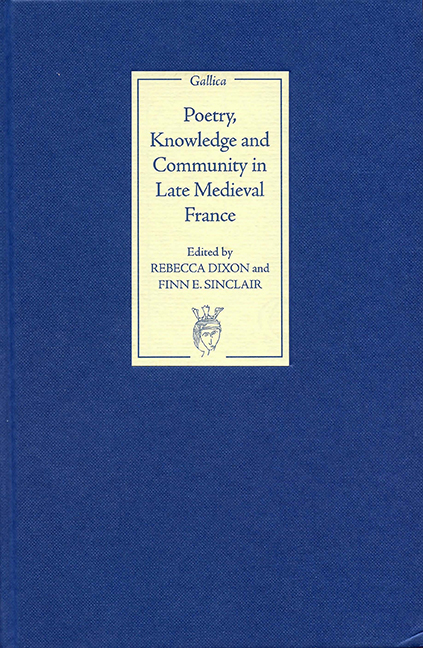Book contents
- Frontmatter
- Contents
- List of Illustrations
- List of Contributors
- Preface
- Introduction: L'Amour de Sophie. Poésie et savoir du Roman de la 1 Rose à Christine de Pizan
- PART I LEARNED POETRY/POETRY AND LEARNING
- Part II Poetry or Prose?
- 5 Les Razos et l'idée de la poésie
- 6 A Master, a Vilain, a Lady and a Scribe: Competing for Authority in a Late Medieval Translation of the Ars amatoria
- 7 Deversifying Knowledge: The Poetic Alphabet of the Prose Pèlerinage de la vie humaine
- 8 Prosifying Lyric Insertions in the Fifteenth-Century Violette (Gérard de Nevers)
- 9 The Movement from Verse to Prose in the Allegories of Christine de Pizan
- Part III Poetic Communities
- Conclusion: Knowing Poetry, Knowing Communities
- Bibliography
- Index
- Miscellaneous Endmatter
7 - Deversifying Knowledge: The Poetic Alphabet of the Prose Pèlerinage de la vie humaine
from Part II - Poetry or Prose?
Published online by Cambridge University Press: 25 October 2017
- Frontmatter
- Contents
- List of Illustrations
- List of Contributors
- Preface
- Introduction: L'Amour de Sophie. Poésie et savoir du Roman de la 1 Rose à Christine de Pizan
- PART I LEARNED POETRY/POETRY AND LEARNING
- Part II Poetry or Prose?
- 5 Les Razos et l'idée de la poésie
- 6 A Master, a Vilain, a Lady and a Scribe: Competing for Authority in a Late Medieval Translation of the Ars amatoria
- 7 Deversifying Knowledge: The Poetic Alphabet of the Prose Pèlerinage de la vie humaine
- 8 Prosifying Lyric Insertions in the Fifteenth-Century Violette (Gérard de Nevers)
- 9 The Movement from Verse to Prose in the Allegories of Christine de Pizan
- Part III Poetic Communities
- Conclusion: Knowing Poetry, Knowing Communities
- Bibliography
- Index
- Miscellaneous Endmatter
Summary
Nearly one hundred extant manuscripts, translations into English, German, Dutch, Spanish and Latin and an influence on the naming of New World islands attest to the widespread popularity of Guillaume de Deguileville's fourteenthcentury pilgrimage allegories. Deguileville's first allegory, the Pèlerinage de la vie humaine, circulated in two versions, the allegory composed c. 1331 and a longer version revised by the author c. 1355, distinguished hereafter as Vie1 and Vie2 respectively. In 1464, the shorter, more widely read Vie1 inspired a dérimage dedicated to Jeanne de Lanval. This prose version of the text was especially popular with late medieval and early modern readers, inspiring at least five print versions between 1485 and 1506, several being reissued multiple times. Not all readers reacted favorably to the dérimage, however: two sixteenth-century editions containing a modernized form of Deguileville's Vie2 begin with a verse prologue that derides the prose of the dérimage. As this prologue indicates, these two adaptations of Deguileville's first allegory – the dérimage and Vie2 – assign contrasting values to verse. Yet each version uses distinct lyric passages to interrelate or to distinguish the voices of the allegory's intradiegetic narrator and characters and its extradigetic author, sources and readers. I examine these distinct lyric passages in the dérimage and in Deguileville's Vie2 to discover their functions and their relation to the allegory's acknowledged Latin and French sources.
The verse prologue critical of the dérimage overtly laments the replacement of poetry with prose:
Pieca quelque ung ne scay pourquoy
Le translata de rime en prose
En quoy mal fist comme je croy
Car mal a droit vient ceste chose
Comme se le methamorphose
L'en mettoit en langue rural…
Touteffois ainsi qu'en latin
Ovide plusieurs fables fainct
Semblablement de pres actainct
Poesie nostre guile ville
Par quoi ne devoit estre enfrainct
Aucunement son plaisant stile. (fol. 1r)
[Recently someone, I don't know why, translated it from rhyme to prose. To my mind, he did wrong. For this is a clumsy thing, like putting the Metamorphoses into rustic language … Just as Ovid made many fables in Latin, our Deguileville similarly comes close to allegory, so his pleasing style should not be disrupted at all.]
- Type
- Chapter
- Information
- Poetry, Knowledge and Community in Late Medieval France , pp. 111 - 124Publisher: Boydell & BrewerPrint publication year: 2008

